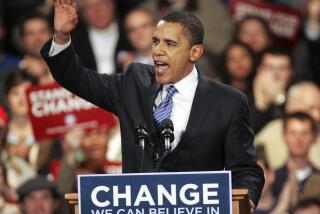Challenges and Defeats Made Gephardt Stronger
WASHINGTON — On a cold March evening in 1988, Dick Gephardt settled into his Dallas hotel room after a long day of campaigning for president, turned on the television and saw trouble. Big trouble.
A crucial clutch of Southern primaries was just days away, yet everywhere he looked there were ads from fellow Democrats attacking him as a political opportunist and a tool of special interests. His campaign, despite strong performances in Iowa and New Hampshire, was nearly penniless, too poor to respond.
Campaign manager Bill Carrick remembers calling later to warn that Gephardt was sinking precipitously in the polls. But the candidate didn’t need to be told his campaign was about to collapse. “I can see, just sitting here in the room watching television. Everyone is attacking us,” he told Carrick.
Gephardt was trounced in the South’s Super Tuesday primaries, and his 1988 presidential bid officially ended soon afterward. But that campaign was Gephardt’s Rubicon, a crossing that reshaped the rest of his political career.
Like most highly successful politicians, each of the candidates for the Democratic nomination for president this year has been transformed by early political or personal battles. For some, those turning points were moments of career success, bold courage or blind luck. For others, they were moments of setback and failure.
For Gephardt, the change brought on by his campaign and humiliating defeat in 1988 helped make him a far different -- and in many ways stronger -- candidate for the presidential nomination now, 16 years later.
He was something of a Johnny-one-note in 1988, when his protectionist trade views dominated his campaign. Today, he is a candidate with a platform that includes an ambitious health-care plan and a politically risky call for repealing President Bush’s tax cuts.
Once a piker at political fundraising, he has spent the last decade expanding his network of big Democratic donors. Gephardt raised about $9 million in his entire 1988 campaign; he raised nearly twice that in 2003, his staff estimates.
A stiff, remote candidate in 1988, Gephardt has opened up and made personal anecdotes the centerpiece of his campaign speech. He repeatedly mentions his now-33-year-old son’s triumph over cancer as a toddler, citing it as an example of why every family in America should have health insurance.
“I was 46 years old when I did it before,” Gephardt said in a recent interview, sipping coffee at his campaign headquarters in Washington. “I’m 62 now. I feel more certain about what I want to do when I become president.”
In one way, Gephardt’s campaign strategy is strikingly similar to his 1988 game plan: He aims to win the opening contest in next Monday’s Iowa caucuses, and he hopes that will generate enough money and momentum to carry him to victory in other states. The similarity between ’88 and ’04 has opened him to charges that he is a shopworn politician whose time has come and gone.
“He is running essentially the same campaign he ran in 1988, and we all saw the results of that,” said Jay Carson, spokesman for former Vermont Gov. Howard Dean, Gephardt’s leading rival.
Gephardt campaigned in 1988 as a little-known House member with an anti-establishment message. But now, after serving more than 10 years as House Democratic leader, he is the quintessential establishment figure in a campaign where Dean has shot to the front of the field as the insurgent outsider.
Gephardt is Dean’s perfect foil: He is the experienced politician up against Dean’s fresh-faced appeal. Gephardt supported the invasion of Iraq that Dean so vehemently opposed. And Gephardt is the prototype of the congressional Democrat that Dean has demonized.
Gephardt’s best hope is to rise above the rest of the pack as his party’s principal alternative to Dean. But to do that, he will have to first win the Iowa caucuses -- as he did in 1988, astonishing the political world.
Gephardt has not quite outgrown his open-faced, Eagle Scout demeanor. Throughout his political career, his appearance has been like a uniform: crisp white shirts, perfectly coiffed strawberry-blond hair, game face always on.
While his appearance may have remained constant, his politics have evolved. The 1988 presidential campaign itself was the culmination of a decade-long transformation, from a moderate-to-conservative Democrat from St. Louis into a national politician more at home on the party’s left flank.
Coming from a heavily Catholic district, Gephardt for years supported a constitutional amendment to ban abortion as “necessary to clarify our belief in due process and the sanctity of life.” During his first four terms in office, Gephardt was such a reliable proponent of gun rights that he won top ratings from the National Rifle Assn. He voted for Ronald Reagan’s big 1981 tax cut.
Gephardt was a leader of a band of young Democrats who believed that their party had to move to the center to succeed nationally. When they formed the centrist Democratic Leadership Council in 1985, Gephardt was founding chairman. Fortune magazine called him “The Middlest Middle-of-the Road Democrat.”
All that changed in the run-up to his 1988 campaign. In 1986, he abandoned his support for measures to ban abortion. His rating from the NRA dropped to a D. He broke with his free-trade colleagues at the Democratic Leadership Council by advocating policies they considered protectionist. Those changes brought his views more in line with core constituencies of the Democratic Party, including the labor unions that would become staunch allies.
Such fundamental changes in Gephardt’s views did not go unnoticed. They opened him to charges that he was a chameleon, willing to change core beliefs to advance his political career.
Gephardt has always denied that his repositioning was politically motivated, saying he had genuine changes of heart on major issues as he evolved from a congressman to a party leader.
“You need to learn and change when it is the right thing to do,” Gephardt said in the interview.
*
Clear Ambitions
Donald J. Foley, a longtime advisor, said Gephardt’s presidential ambitions first became clear the weekend after the 1984 presidential election, when President Reagan scored a landslide victory over Democrat Walter F. Mondale.
Gephardt called his staff to a meeting at his home in the Virginia suburbs of Washington. On the agenda: how to catapult an obscure Missouri House member to the top of his party. He needed to travel, especially to states with early presidential primaries, they decided. He also needed to raise money. And he needed to raise his profile.
“He was largely unknown at the time,” Foley recalls. “He knew it was going to be a long haul.”
So began the siege of Iowa. Gephardt modeled his strategy on Jimmy Carter’s surprising 1976 victory in the state’s caucuses. Gephardt traveled to the state so often that, by the time he formally announced his candidacy in February 1987, he had already visited Iowa 41 days in two years. He moved his family -- including his mother -- to temporary housing in Iowa.
He entered the presidential race exactly one year before the 1988 Iowa caucuses. He flew out of Washington in a blizzard to announce his candidacy at St. Louis’ historic Union Station, the same place Harry S . Truman posed for his famous 1948 picture holding a newspaper declaring “Dewey Defeats Truman.”
Gephardt hammered on the issue that quickly became his trademark: the risks to American jobs from unfettered free trade. His message struck a chord at a time when Japan and other countries were subsidizing manufacturers and making imported goods cheaper than U.S.-made goods.
“People sitting in cushy offices, in secure jobs, have no right to tell workers on assembly lines that their hopes and livelihood have to be sacrificed on the altar of a false and rigid free-trade ideology,” Gephardt said in his Union Station speech.
Gephardt and his advisors found a powerful way to reduce the complex trade issue to lunch-bucket terms. They pointed out that a $10,000 Chrysler cost $48,000 in South Korea, after taxes and fees. In a television ad broadcast in Iowa the week after Christmas, Gephardt said that if he were president, Koreans would be “asking themselves how many Americans would pay $48,000 for one of their Hyundais.”
Gephardt’s campaign caught fire among beleaguered farmers and union members. It paid off in the February Iowa caucuses. He won 31% of the state’s delegates -- almost 5 percentage points ahead of his closest competitor in the densely packed field. He finished second, behind Massachusetts Gov. Michael S. Dukakis, in New Hampshire’s primary.
But it was downhill from there. His campaign was broke.
“We anticipated if he won Iowa, the money would come rolling in,” said former Rep. Tony Coelho, a close ally of Gephardt’s. “That didn’t materialize.”
Gephardt was financially hobbled just as the race was heading into the crucial Super Tuesday primaries in 16 states, most of them in the South. Democratic rivals attacked with a vengeance. Dukakis ran a television ad criticizing Gephardt’s shifts on abortion and other issues, illustrated by an acrobat flip-flopping across the screen. It would prove devastating to Gephardt’s campaign. Another TV spot, also damaging, criticized Gephardt for accepting money from political action committees.
His campaign was too cash-strapped to respond.
“I thought then, ‘We’ve got a problem,’ ” he recalled recently. “Most of the people in those states really didn’t know me. This was all they were seeing.”
By the evening of Super Tuesday, the only contest Gephardt won was his home state of Missouri. He went through the motions of competing in the Michigan primary two weeks later, but he limped in a distant third.
“It’s been said that the opera isn’t over until the fat lady sings,” Gephardt told supporters when he announced the end of his campaign. “Last Saturday in Michigan, I think I heard her walking to the microphone.”
Gephardt’s associates assumed that he would run for president again, and many expected him to return to the trail in 1992. Indeed, he hired some staff with the understanding that they would help him prepare for that campaign.
But his plans were abruptly thrown off course in 1989, after House Speaker Jim Wright and Coelho, who was House majority whip, resigned from Congress in the face of ethics charges. In the tumult that followed, Gephardt was abruptly and unexpectedly thrust into the position of House Majority Leader -- in part on the strength of his new credentials as a national leader.
Although that promotion postponed his second presidential run, it gave Gephardt time and new opportunities to improve the political skills lacking in the 1988 campaign.
Gephardt and his allies had concluded that his inadequate fundraising had been a fatal flaw in his first presidential campaign. As Democratic leader of the House, he honed his fundraising skills and expanded his contacts with party donors as he worked to reelect colleagues.
“Dick learned how to ask for money,” said Coelho. “And he ended up becoming very good at it. He had had a hard time with that.”
*
New Bridges
Being Democratic leader also gave Gephardt a chance to build new bridges. In 1993 he strengthened his bond with the labor movement when he helped lead the fight against the North American Free Trade Agreement -- even though that was a signature issue for the president from his own party, Bill Clinton.
Gephardt also worked to expand his involvement in issues beyond trade policy.
“I don’t think there’s any doubt that he needed to broaden,” said Tom O’Donnell, a longtime senior aide to Gephardt. “He couldn’t make a career on the trade issue.”
While being Democratic leader helped Gephardt prepare to be a stronger presidential candidate, it also saddled him with political liabilities his current rivals are trying to exploit. Gephardt headed the party during its 1990s losing streak on Capitol Hill. He had the dubious honor of handing the House speaker’s gavel to Newt Gingrich after Republicans won control of Congress in 1994.
Publicly humbled on the House rostrum, Gephardt declared: “With resignation but resolve, I hereby end 40 years of Democratic rule in this House.”
Despite his resolve, Gephardt failed in three successive elections to lead his party back to a House majority -- a record critics point to in calling him a loser.
But nothing Gephardt has done or failed to do as leader has drawn so much fire from his party’s base as his decision last year to support Bush’s plan to invade Iraq.
In Iowa, where antiwar sentiment has propelled Dean to the front of the pack, Gephardt’s position on the war has made it harder to win that do-or-die state. So while he was attacked in 1988 for moving to the left on issues like abortion, he is under fire today for tacking to the right on national security.
If he fails to win the White House a second time, his long political career will probably be over; he has said he would not run for reelection to the House even if he dropped out of the presidential race. It would be a disappointment for him with a silver lining for his wife, Jane, who was not enthusiastic about this second run for president.
Even the relentlessly ambitious Gephardt seems oddly serene about the possibility of political failure, saying it pales in comparison to the agony of watching his son struggle with cancer more than 30 years ago.
“After you’ve been through what I’ve been through with my son, nothing really bothers me,” Gephardt said, sitting in a long, brightly lighted conference room in his campaign headquarters. “I know what’s important.”
*
(BEGIN TEXT OF INFOBOX)
Dick Gephardt
Personal
Born: Jan. 31, 1941
Hometown: St. Louis
Family: Married to Jane Byrnes Gephardt; three children, Matt, Chrissy and Kate
Education: Northwestern University, bachelor of science, 1962. University of Michigan Law School, 1965
Career: Air National Guard, 1965-1971; lawyer; St. Louis city alderman, 1971-1976; U.S. House 1977-present; House minority leader 1995-2002
*
By the numbers
$2.27 million: Amount spent on TV ads
$1.48 million: Amount spent on TV ads in Iowa
$13.67 million: Amount raised by the Gephardt campaign as of Oct. 15
$3.8 million: Amount the campaign estimates it raised in the final three months of the year
27: Years Gephardt has served in the U.S. House of Representatives
36: Years he has been married to his wife, Jane
31.3: Percent Gephardt won of the Iowa Democratic caucus vote in his 1988 presidential campaign, beating eventual Democratic nominee Michael S. Dukakis by 9%
22: Number of unions endorsing the labor-friendly candidate
*
A closer look
Gephardt, an Eagle Scout and former fraternity president, represents the same Missouri district he grew up in. His son, Matt, nearly died of a prostate tumor at 18 months, and Gephardt cites this family trauma as the basis for his wide-ranging $200-billion health-care proposal. His daughter, Chrissy, came out as a lesbian several years ago and actively campaigns for her father; Gephardt supports same-sex unions but not gay marriage.
*
The lowdown
Gephardt’s years of national political experience appeal to the Democratic base, and his roots in the Midwest, where the 2004 election will likely be decided, could make him a strong general election candidate. But familiarity has bred indifference among many Democrats who say Gephardt’s time has passed. Anything shy of victory in Iowa would almost certainly end his campaign.
Analysis by Times staff writer Mark Barabak
Sources: National Journal, Washington Post, www.dickgephardt2004.com
*
Tuesday: Howard Dean
More to Read
Get the L.A. Times Politics newsletter
Deeply reported insights into legislation, politics and policy from Sacramento, Washington and beyond. In your inbox three times per week.
You may occasionally receive promotional content from the Los Angeles Times.











